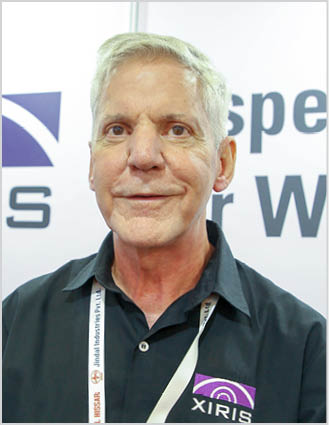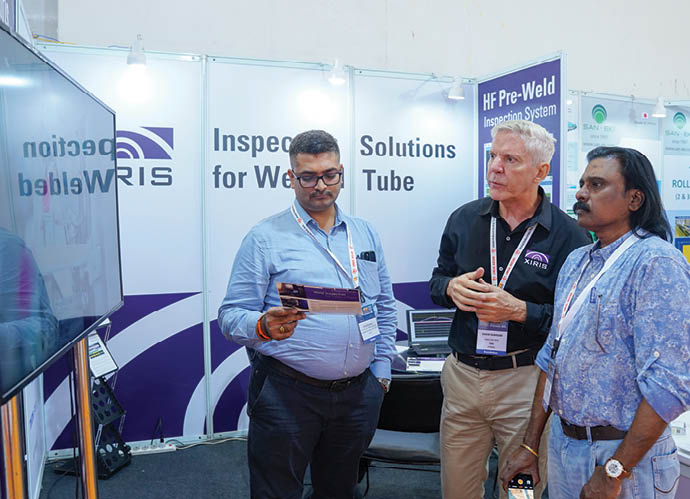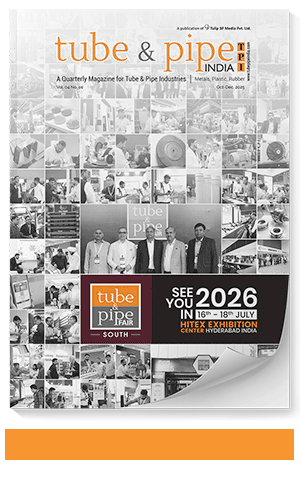
Xiris Automation Inc, developers of technology that can monitor for minute defects in welded tubes and pipes, see huge potential in the Indian market. This was revealed by Mr. David Garrard, Director-APAC at Xiris Automation Inc, in an exclusive interview with Tube & Pipe India.
Tube & Pipe India: Please tell us about your company and the products and technologies you offer for the tube and pipe industry.
David Garrard: Xiris Automation Inc. develops machine vision technology that enables cameras to monitor, recognize, and detect quality defects in metal manufacturing processes. Our primary focuses are the tube and pipe industry and in welding automation.
For the tube and pipe industry we offer a post-weld inspection tool that is placed immediately after the weld box on a welded tube or pipe mill. This tool uses a laser line and a high-speed, high-resolution camera to detect weld and tube geometry deviations down to the micron level. Adopting this technology can lead to a significant enhancement in the quality of a customers’ tubes. In industries such as nuclear energy or high-pressure applications, where tube leaks can be catastrophic, our technology is crucial. Our customers also include those producing tubes for the aerospace and automotive industries, where tube quality is also paramount. The Xiris solutions provide operators with early insights into the mill forming and welding operations, allowing them to proactively address issues before they escalate.
Additionally, we offer weld cameras for automated welding applications across various metal fabrication sectors, enabling real-time analysis of weld pools for alignment, size variations and more recently, melt temperature monitoring.
TPI: Where are your major markets, and what motivated you to enter the Indian market?
DG: Our major markets include the US and Europe, where there is a strong demand for the high-quality solutions Xiris offers. The Indian market is currently in a developmental stage and holds tremendous potential. We already have significant clients like Tata Steel and ArcelorMittal, who have seen value in our products for both their international and Indian operations. For example, Tata Steel in the Netherlands started with one of our systems six years ago, and now they have over 12. Establishing a strong footprint in India before our competitors is a strategic priority for us.
TPI: How would you describe your experience of doing business in India?
DG: The Indian market is challenging but evolving rapidly in the right direction. There is a growing openness to innovative solutions and a better recognition of the importance of quality compared to a decade ago. Although price remains a hurdle, it is gradually becoming less of a barrier, which bodes well for the market. The adoption of new technologies and higher-quality standards will enhance India’s reputation for product quality both domestically and internationally.
TPI: What is the typical lead time for manufacturing and delivering a machine?
DG: The lead time varies depending on the solution. A camera solution typically takes three to four weeks, while a laser-based solution can take six to eight weeks. Our consignments are shipped from Canada, and most of the time, installation is not required. However, in some cases, we will send our installation experts to set up the systems on-site.
TPI: Do you offer customization options?
DG: Yes, we provide customization based on the size of the tubes being manufactured. For instance, mills producing small diameter tube will require a different sensor size compared to a large tube mill. We offer tailored solutions for various tube sizes from 5mm on up beyond 700mm and have integration capabilities that allow us to connect to PLCs, send warnings and errors states to cutters or marking devices. We have customers who are reading our sensor data and conducting machine learning and AI for more advanced applications.
TPI: What are some of your best-performing machines in the market?
DG: Our tube and pipe laser profiling product is unique and faces little competition. We also have a thermal camera that we’ve developed and have been selling to high-end research institutes globally, including the atomic energy sector in India. We have sold it also for ERW tube V-angle analysis. Our most widely sold products are our high-dynamic range weld cameras, which are used extensively to monitor welding processes for defects. We have an automated seam monitoring solution for laser and TIG welding tube mill operators.
TPI: Can you share details about recent innovations or new technologies you have incorporated into your products?
DG: We are continuously innovating, particularly with our software – with the recent introduction of a Melt Pool AI solution. Due to customer interest we introduced a specialized microphone that can operate in challenging welding environments. This microphone listens to the sound of welding and detects anomalies in the audio signal, providing real-time alerts. Further, due to the extreme brightness associated with welding, we have developed specialty illumination and optical filtering to improve our ability to perform real-time machine vision analysis on weld pools.
TPI: What is your overall production capacity at the moment?
DG: Our company is relatively small, with less than 100 employees, a third of whom are in the production department. We are constantly working to meet our order demands. If we received an order for 100 cameras, it would take us several weeks to fulfill it. These are all custom build orders.
TPI: As a manufacturer, what are some of the major challenges you often encounter in the market?
DG: The tube, pipe, and welding industries are inherently challenging due to the harsh conditions, including heat, fumes, and liquids. Our cameras need to be robust, with cooling systems, spatter protection, and air knives to ensure accuracy and durability. These conditions mean there are challenges in engineering design and packaging. Doing all that for a price that is attractive to the customer can sometimes be an issue.
Also Read: Tube & Pipe India Emagazine Aug-Sep Issue 2024
TPI: What is your perspective on the growth prospects of the Indian tube and pipe industry?
DG: The industry is evolving rapidly, particularly in terms of inspection. Our Indian tube industry partner, who sell other technologies, has noted a significant increase in investment in better, higher-quality technology so that top-tier Indian producers can compete internationally on quality, and price. This is promising for us, as companies aiming for global quality levels will need our inspection systems.
TPI: What kind of policy-level interventions would you like to see to make doing business easier for companies like yours?
DG: Selling in India comes with its challenges, such as obtaining BIS certification and dealing with letters of credit and performance bank guarantees. These are not common hurdles in other parts of the world. We believe that a shift towards a more open business-friendly policy would be beneficial to Indian industry and Indians in general.

TPI: Where do you see yourself in the Indian market in the next five years?
DG: We foresee substantial growth in India over the next five years. We sold our first tube inspection system in India late last year and have already sold a second one. Our client, a premium company, has indicated that once they validate the product’s value, there will be significant sales across their operations, potentially mandating it for their suppliers as well. This would be a huge win for us.
TPI: What are your takeaways from the Tube & Pipe Fair 2024 edition in Hyderabad?
DG: Our business thrives on strategic partnerships, and industry fairs like this one are invaluable for building those connections. We’ve already had three promising meetings and received samples for testing in our laboratory. These opportunities might not have arisen if we hadn’t attended the show. These fairs are crucial for our business.
TPI: What marketing and branding initiatives do you use to keep your clients informed about your latest technologies?
DG: Apart from attending industry shows, we are very active on social media. Because our products involve cameras, we can easily prepare visually striking and easy-to-understand selling content right from our sensors. Not many people have ever seen the tube weld bead profile of their tube mill, or watched a weld pool form in real time. Our marketing strategy focuses on using these types of videos to showcase the value and ease of use of our products. Once prospects have seen the videos it is a matter of building trust and helping the prospect see the quality and ROI boost that they could derive from a Xiris solution.










